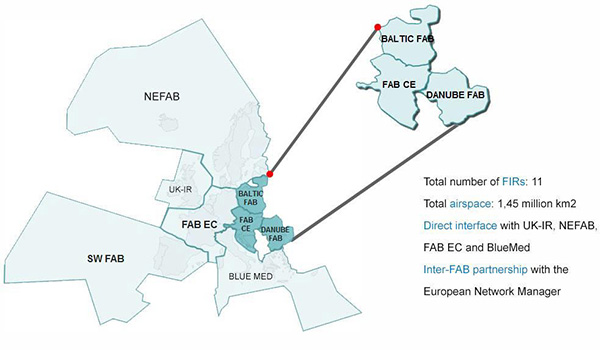The Air Navigation Services Providers (ANSPs) of ten countries comprising the region from the Baltic Sea to the Black Sea signed on 6 November 2013 a strategic cooperation agreement on establishing a regional cooperation platform.
The purpose of the strategic alliance titled GATE ONE, covering the area of three functional airspace blocks is to promote the efficiency of European Air Traffic Management through an enhanced cooperation among the participating service providers, moreover to ensure a more powerful and coordinated advocacy of the countries of the region in the European decision-making processes.
The agreement has been signed in Sofia by the CEO’s of the ANSPs of Austria, Bulgaria, the Czech Republic, Croatia, Poland, Lithuania, Hungary, Romania, Slovakia and Slovenia. The Parties agreed on the accession of Bosnia-Herzegovina ANSP at their next meeting in January 2014.

The airspace between the Baltic Sea and the Black Sea is one of the most important gateways of the European continent: this region handles air traffic in the directions of North and South, East and West, sustaining links between the central and Nordic countries of the European Union as well as with the continent of Asia and the region of the Middle East.
The actual developments of the European Air Traffic Management industry point towards the assumption that the air navigation service providers of the region, operating under similar conditions, can only be efficient in attaining their interests in case they create a closer cooperation in the coordination of strategic issues (and the operative issues being meaningful at the regional level). Furthermore, they need to strive towards representing a consolidated position concerning common technical and economic issues affecting the region and vital to the Union-wide picture of the Air Traffic Management.
The founders of the GATE ONE platform have pointed out that they support the implementation of the Single European Sky with a view to promote the competitiveness of European air transport and the actors of the industry, making air travel faster and more comfortable in addition to mitigating the impact of greenhouse gas emission by the sector. It was noted at the same time that overregulation and unnecessary bureaucratic burden imposed on the service providers of the industry shall be avoided in the course of air traffic control reform. With respect to the Single European Sky objectives set by the European Commission, the signatories to the agreement pointed out in regard to the draft regulation of SES II + that in its present form it does not constitute the content for new legislative steps, it needs in a number of its provisions further refinement and detailed evaluation and justification of its elements before it can be put into effect.
The founders of the strategic platform GATE ONE covering the airspace of three functional airspace blocks (Baltic FAB, Danube FAB and FAB CE) called attention to the necessity of developing new regional forms of cooperation among air navigation service providers crossing borders of functional airspace blocks and creating the interoperability of various technical and airspace systems.

